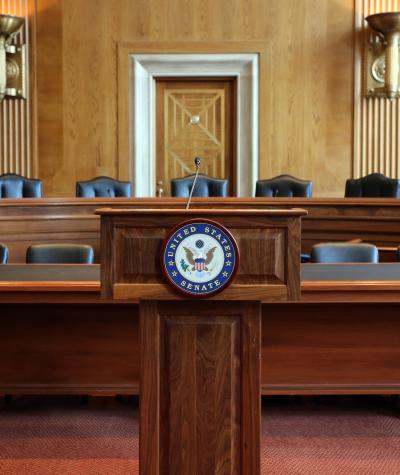President-elect Donald Trump may attempt to have the U.S. Senate confirm his political nominees without a complete investigation into their financial holdings and potential conflicts of interest.
This ethics investigation, conducted by the Office of Government Ethics (OGE), is a legal requirement and an indispensable part of our system of checks and balances that ensures any public official nominated by the president will dutifully serve the American people.
Skipping it is a highly unprecedented move that would violate the law and could place people unfit to serve in the most powerful positions in our government.
While a nominee’s financial disclosure report does not have to be filed until the president-elect begins their term and officially nominates the individual, the process usually begins during the transition period, for two reasons.
First, a president-elect may want to ensure their nominee does not have significant or incurable conflicts of interest that would be identified during an investigation before they publicly announce their pick.
Second, the quicker the nominee files a financial disclosure report, the quicker the Senate will have all the information needed to schedule a confirmation hearing and begin filling the president’s administration.
President Joe Biden’s Cabinet nominees filed their paperwork in December and early January, and his nominees consequently cooperated with the OGE. Nominees divested individual stock holdings in publicly traded companies and privately held business interests, and any interests they maintained were carefully monitored and restricted by the OGE.
Biden’s nominees’ cooperation with the OGE investigation is a key reason why he was able to have an almost fully confirmed cabinet within 60 days of assuming office, allowing his administration to immediately get to work and demonstrate effective bureaucracy to the public.
President Barack Obama had seven of his cabinet officials confirmed on the same day he took office, after they all submitted their paperwork by early January.
In contrast, Trump’s delay with submitting paperwork to the OGE made his 2017 confirmation process drag on and prevented him from filling his cabinet until three months after his inauguration.
This time around, Trump may be angling to forgo the process altogether.
Why the ethics reviews matter
The Ethics in Government Act (EIGA) requires nominees to file a financial disclosure report to the OGE within five days of the president’s nomination, detailing their holdings and any potential conflicts of interest they may have.
The OGE, the agency the individual was nominated to, and the nominees themselves then work together to mitigate those conflicts and to prepare the nominee for assuming public office.
Conflicts of interest must be remedied before a nominee assumes public office
Identifying and resolving conflicts of interest is a critical step in preparing nominees for public office. It is a federal crime for executive branch officials to participate in government matters that would directly and predictably affect their financial interests.
Consequently, any potential cabinet members or agency heads — whose regulatory authority will cover vast swaths of the U.S. economy — may find themselves in violation of the criminal conflict of interest statute if they retain stock holdings, private investments, or business ownership that conflicts with their job.
Moreover, nominees agreeing to divest their stock holdings and remove their potential conflicts of interest signals to the American people that, if confirmed, they will dutifully comply with the laws that govern public service.
It is already highly unusual that Trump began announcing his nominations without beginning the ethics investigation and vetting his picks. This, coupled with the fact that the inauguration and subsequent confirmation hearings are just a few weeks away, suggests that Trump’s nominees have no plans to initiate the process at all.
The OGE has a critical, nonpartisan responsibility to ensure that our public officials are not beholden to any interest but the public. Campaign Legal Center (CLC) calls on the U.S. Senate to demand that the OGE conduct a full investigation into potential conflicts of interest before any confirmation hearings can be held.


